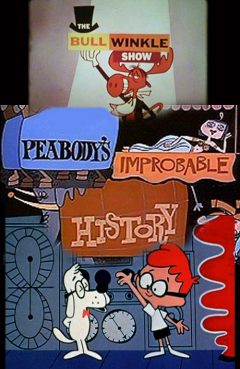
The Bullwinkle Show
Peabody's Improbable History - The Texas Rangers
| S 5 | Ep 10 | 1963/11/05 |
| TV Series Episode | 4 min TV-G | |
| COM | ||
Mr. Peabody, Sherman, Governor, Laredo Citizen, Bullwinkle, Captain R.J. Hotchkiss, Cowboy, Dallas Kid.

The Bullwinkle Show
Peabody's Improbable History - Cleopatra
| S 5 | Ep 11 | 1963/11/12 |
| TV Series Episode | 4 min TV-G | |
| COM | ||
Mr. Peabody and Sherman set the Wayback Machine to encounter Cleopatra, Ptolemy and Julius Caesar. Mr. Peabody, Sherman, Cleopatra, Prince Ptolemy, Julius Caesar, Carnival Barker, Soldier.
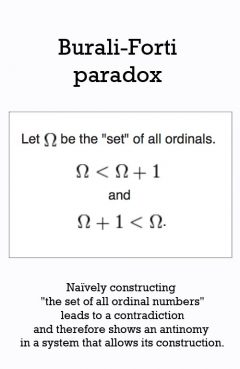
The Burali-Forti Paradox
If the ordinal numbers formed a set, it would be an ordinal number that is smaller than itself.
| S - | Ep - | |
| - min | ||
In set theory, a field of mathematics, the Burali-Forti paradox demonstrates that naively constructing "the set of all ordinal numbers" leads to a contradiction and therefore shows an antinomy in a system that allows its construction. It is named after Cesare Burali-Forti, who discovered it in 1897. (Naive set theory)
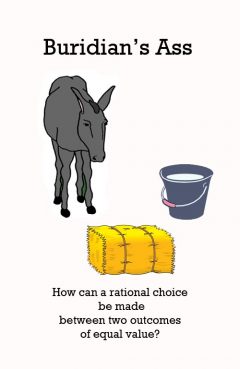
Buridan's Ass
How can a rational choice be made between two outcomes of equal value?
| S - | Ep - | |
| High | - min | |
Buridan's ass is an illustration of a paradox in philosophy in the conception of free will. It refers to a hypothetical situation wherein an ass that is equally hungry and thirsty is placed precisely midway between a stack of hay and a pail of water. Since the paradox assumes the ass will always go to whichever is closer, it will die of both hunger and thirst since it cannot make any rational decision to choose one over the other. The paradox is named after the 14th century French philosopher Jean Buridan, whose philosophy of moral determinism it satirizes. A common variant of the paradox substitutes two identical piles of hay for the hay and water; the ass, unable to choose between the two, dies of hunger. Psychological / Philosophical
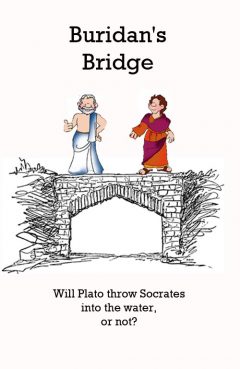
Buridan's Bridge
Will Plato throw Socrates into the water or not?
| S - | Ep - | |
| High | - min | |
Buridan's Bridge (also known as Sophism 17) is described by Jean Buridan, one of the most famous and influential philosophers of the Late Middle Ages, in his book Sophismata. Sophism 17 is a self-referenced paradox that involves a proposition pronounced about an event that might or might not happen in the future. The sophism is: Imagine the following scenario: Socrates wants to cross a river and comes to a bridge guarded by Plato, who says: Plato: Socrates, if in the first proposition which you utter, you speak the truth, I will permit you to cross. But surely, if you speak falsely, I shall throw you into the water. Socrates: You will throw me into the water. Buridan's solution[edit] In order to solve the paradox Buridan proposes three questions: 1 Is the proposition uttered by Socrates: "You are going to throw me into the water" true, or is it false? 2 Is Plato's promise true or is it false? 3 "What ought Plato to do to fulfill his promise?"[3] In response to the first question Buridan states that it is impossible to determine if Socrates' proposition is true or false. This is because the proposition "You are going to throw me into the water" is a future contingent that could be true or false depending on what Plato is going to do. Dr. Joseph W. Ulatowski says that Buridan apparently used Aristotle's thesis about what "truth" is to come up with this response. Aristotle believed that a proposition is true if and only if it is verified by the state of things as they currently are. Contradicting the principle of bivalence, Buridan implies a system of three-valued logic in which there are three truth values--true, false, and some indeterminate third value.[3] In determining the truth value of Plato's conditional promise, Buridan suggests that Plato's promise was false, and that because Plato gave his promise carelessly he is not obligated to fulfill the promise.[3] In discussing the third question, "What ought Plato to do to fulfill his promise", Buridan states that Plato should not have given a conditional promise in the first place. He also suggests that Plato could have made sure that the condition was formulated in such a way that it would not cause a contradiction; because Plato cannot fulfill his conditional promise without violating it, he is not obligated to fulfill the promise. Ulatowski points out that this is the contrapositive of the principle stated by Immanuel Kant: "ought implies can".[3]

Burned at the Stake
| Film | - min | |
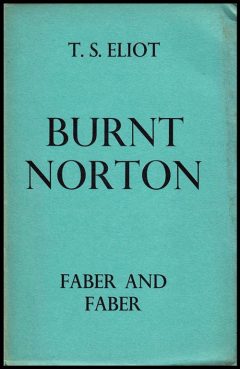
Burnt Norton
| S - | Ep - | 1936// |
| Short Story | - min | |
Begins with "Time present and time past / Are both perhaps present in time future..." Time present and time past Are both perhaps present in time future And time future contained in time past. If all time is eternally present All time is unredeemable. Burnt Norton is the first poem of T. S. Eliot's Four Quartets. He created it while working on his play Murder in the Cathedral and it was first published in his Collected Poems 1909_1935 (1936). The poem's title refers to a Cotswolds manor house Eliot visited. The manor's garden served as an important image within the poem. Structurally, the poem is based on Eliot's The Waste Land with passages of the poem related to those excised from Murder in the Cathedral. The central discussion within the poem is on the nature of time and salvation. Eliot emphasises the need of the individual to focus on the present moment and to know that there is a universal order. By understanding the nature of time and the order of the universe, mankind is able to recognise God and seek redemption. Many reviewers of Burnt Norton focused on the uniqueness and beauty of the poem. However, others complained that the poem does not reflect Eliot's earlier greatness and that the use of Christian themes harmed the poem.

"The Business, as Usual"
| S - | Ep - | 1952/06/ |
| Short Story | - min | |

Buskers & Lou
| Film | - min | |
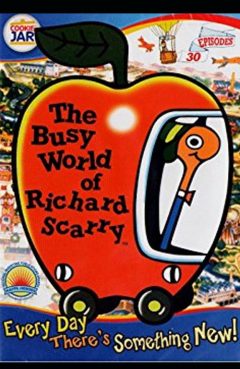
The Busy World of Richard Scarry
Time Travel
| S 1 | Ep 11 | 1995/11/12 |
| TV Series Episode | 7 min TV-Y | |
| FAM | ||
Mr. Fixit tries to keep his latest invention a secret but Huckle and Lowly discover that it's a time machine.

The Busy World of Richard Scarry
A Trip Back In Time
| S 2 | Ep 28 | 1996// |
| TV Series Episode | 7 min TV-Y | |
| FAM | ||
A trip back in time takes place and P.S. Pig gets a new friend. Huckle Cat and Lowly Worm, are accidentally taken back to Colonial Busytown by Mr. Fix-It's Tardis-like time machine. Fortunately, Mr. Fix-It's ancestor helps them fix the broken lever in the time machine (even before today's Mr. Fix-It can rescue them in another familiar looking time machine). This isn't any old elevator, boys. It's a time machine! This is for traveling through time.Ê
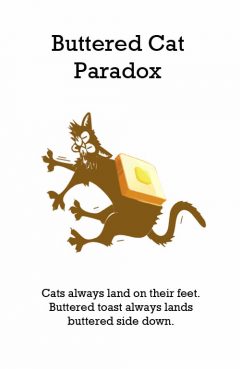
Buttered Cat Paradox
| S - | Ep - | |
| High | - min | |
The buttered cat paradox is a common joke based on the tongue-in-cheek combination of two adages: ´ Cats always land on their feet. ´ Buttered toast always lands buttered side down. The paradox arises when one considers what would happen if one attached a piece of buttered toast (butter side up) to the back of a cat, then dropped the cat from a large height. The buttered cat paradox, submitted by artist John Frazee of Kingston, New York, won a 1993 OMNI magazine competition about paradoxes. The idea may not have originated from Frazee since it had appeared on USENET by May 1992, if not before.[3]
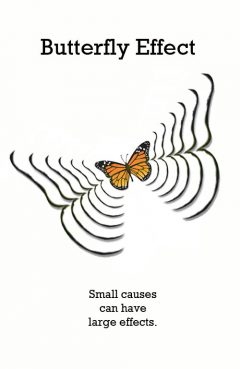
The Butterfly Effect
Small causes can have large effects.
| S - | Ep - | |
| - min | ||
In chaos theory, the butterfly effect is the sensitive dependence on initial conditions in which a small change in one state of a deterministic nonlinear system can result in large differences in a later state. The name, coined by Edward Lorenz for the effect which had been known long before, is derived from the metaphorical example of the details of a hurricane (exact time of formation, exact path taken) being influenced by minor perturbations such as the flapping of the wings of a distant butterfly several weeks earlier. Lorenz discovered the effect when he observed that runs of his weather model with initial condition data that was rounded in a seemingly inconsequential manner would fail to reproduce the results of runs with the unrounded initial condition data. A very small change in initial conditions had created a significantly different outcome.
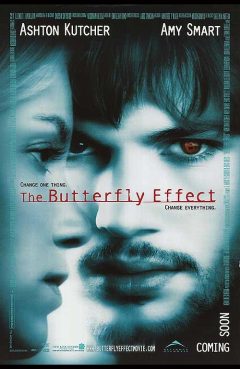
The Butterfly Effect
| 2004/01/23 | ||
| Film | 113 min R | |
| SF THR | USA | |
A young man blocks out harmful memories of significant events of his life. As he grows up, he finds a way to remember these lost memories and a supernatural way to alter his life.
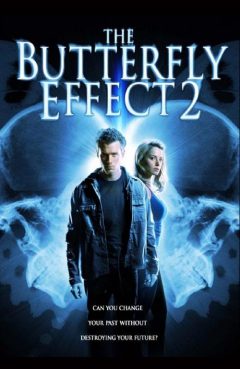
The Butterfly Effect 2
| 2006/08/10 | ||
| Film | 92 min R | |
| DRA SF THR | USA | |
A brain tumor allows a person to change the past by reflecting at relevant pictures. Nick Larson and his best friends Trevor Eastman and Amanda are celebrating the twentieth-fourth birthday of his girlfriend Julie Miller in a beautiful lake on a Sunday morning. Nick is expecting to be promoted in the company where he works, and Julie is planning to move to his place instead of going to New York for her Master degree. However, Nick is called by his colleague Dave Bristol, who is disputing the promotion with Nick, for a meeting with a client. While on the road, Nick has an accident and Julie and his friends die. One year later, Nick finds that he can travel in time and tries to fix the past, with tragic consequences for the future.
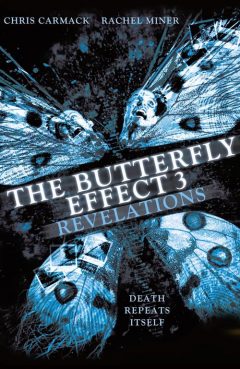
The Butterfly Effect 3: Revelations
| 2009/07/31 | ||
| Film | 90 (105) min R | |
| CRI DRA SF | USA | |
A young man with the power to time travel attempts to solve the mystery of his girlfriend's death. Sam Reide has the ability of traveling to the past and works with the police department solving unresolved crimes, witnessing the events with the support of his sister, Jenna Reide and reporting the criminal's identity to detective Dan Glenn. When Elizabeth Brown, the sister of his former girlfriend Rebecca Brown that was murdered a couple of years ago pays a visit to him, she tells him that she has just found Rebecca's journal with evidences that Lonnie Flennons, who was accused for the murder is innocent. Sam decides to witness the murder of Rebecca and his interference affects the future. He travels to the past to try to fix his mistakes, but every time he returns, the future is in worse condition.
Butterscotch
Butterscotch Over Berlin
| S 1 | Ep 3 | |
| TV Series Episode | - min X | |
| Canada | ||
back in time to Nazi Germany

"Button, Button"
| S - | Ep - | 1953/01/ |
| Short Story | - min | |

Buying Time
| S - | Ep - | |
| Short | - min | |
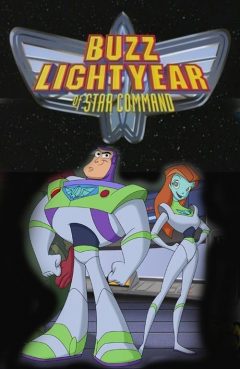
Buzz Lightyear of Star Command
Lost In Time
| S 2 | Ep 1 | 2000/11/25 |
| TV Series Episode | 30 min TV-Y7 | |
| ACT ADV | ||
When Buzz travels into a Black Hole, Zurg uses it to trick him into thinking he is in the future and collect all of his secrets in his latest attempt to destroy Star Command.